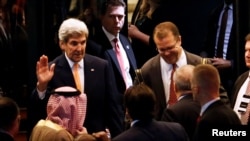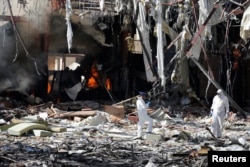U.S. Secretary of State John Kerry on Saturday announced the release of two American citizens who had been held by Houthi rebel militias in Yemen.
Kerry, speaking from Lausanne, Switzerland, where he was participating in talks on Syria, said the two Americans' release was part of a complex diplomatic deal that also included the medical evacuation of wounded Yemenis.
The Americans who left Yemen have not yet been identified. They arrived in Oman on a Royal Air Force of Oman plane that also carried the injured Yemenis, who were wounded in a controversial airstrike one week ago that hit a large group of mourners at a funeral in Sana'a.
Oman's state-run news agency said Saturday's developments followed negotiations between officials from the sultanate and authorities in Sana'a, which is currently controlled by rebels from the Houthi tribe based in northern Yemen.
Airstrikes intensified in August
Yemen's civil war pits the country's internationally recognized government against the Houthis and disaffected army units loyal to a former president of the country. Saudi Arabia has led a coalition of Gulf states that entered the war on the side of the government in March 2015, and that coalition has been supported by the United States.
Talks aimed at ending the war in Yemen were underway in Oman two months ago when the Saudi-led coalition stepped up airstrikes and forced the closure of Sana'a International Airport. That left negotiators representing the Houthis and their allies stranded in Oman, but they were allowed to return home under the latest deal, flying into Sana'a on the same plane that later evacuated the wounded Yemenis and freed Americans.
A spokesman for Kerry said the U.S. was "deeply grateful" to Oman's Sultan Qaboos bin Said for his diplomatic assistance, and also recognized the release of the two Americans as a humanitarian gesture by Houthi leaders. The spokesman, Mark Toner, called for "the immediate and unconditional release of any other U.S. citizens who may be still be held" in Yemen or elsewhere in the region.
Saudis: 'Wrong information' led to attack
The Saudi coalition's bombing of a packed funeral hall in Sana'a a week ago killed at least 140 people and wounded 600 others, an attack that shocked the world and drew widespread condemnation of the Saudi coalition's tactics. It also appears to have galvanized international diplomatic efforts to do more to try to stop the bloodshed in Yemen.
An internal probe by the coalition concluded Saturday that the airstrike was based on "wrong information" and had not been authorized by top-level commanders, The Associated Press reported.
Wounded leave for treatment
In addition to the Yemenis evacuated Saturday to Oman, more than 100 other wounded victims of the funeral hall bombing have since been allowed to seek medical treatment abroad, an unidentified Yemeni government official was quoted as saying.
Kerry said he had spoken with the U.S. envoy to Yemen as well as to Saudi officials, and that he was "continuing to work very hard" to revive negotiations to end the Yemen conflict.
"It remains a top priority for us to try to end the violence and get to the table as soon as possible," Kerry told reporters before leaving Switzerland.






